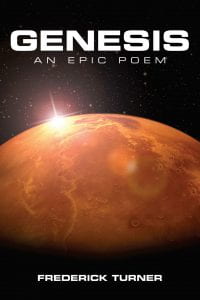United States
First publication date: 1988
Frederick Turner,
Genesis: An Epic Poem of the Terraforming of Mars
In 1988 when Frederick Turner published the 10,000 lines of iambic pentameter that constitute Genesis, his epic on the transformation of Mars from wilderness to garden, he was already that rarity among contemporary writers, an experienced epic poet, having produced his six-book The New World three years earlier.
A poem about the creation of a world, Genesis is narrated by an anonymous twenty-second-century poet who has somehow gotten himself into the head of the twentieth-century Turner. For all its innovations in extraterrestrial locale and often startling assimilation of the language of science into the rhetoric of poetry, it is also very much a traditional epic with an invocation, a sacrificial hero or two, war games in place of funeral games, bloody battles (in outer space), a preternatural “Sybil” as muse and source of wisdom, and dazzlingly inventive similes (“colors passionate as that brown and blue / Which blazes from a pool befilmed with oil” and deciduous trees in autumn that “drop their heavy garment like the flesh / Of saints or martyrs”). Turner establishes his bona fides and his place in the tradition with frequent allusions to, sometimes direct quotations from, previous epics. Perhaps most importantly, Genesis, like many of its ancient forebears, dramatizes a cultural crisis and its stakes and articulates the irresolvable tension between two perspectives. Turner organizes his epic around the ideological conflicts between the terraformers, committed to building a new, habitable biosphere, and environmentalists, or “ecotheists” as the poem fashions them, committed to keeping Mars in a wilderness state.
The “Ares Project” begins as a scientific survey under the auspices of the United Nations and led by the industrialist Chance Van Riebeck. But the project oversteps its mandate, and secretly Chance manages the process of creating an oxygenated Martian atmosphere and introducing bacterial life. The genius behind the terraformation is Chance’s daughter Beatrice, a paleobioligist, aided by her brother-in-law Charlie Lorenz, an ecologist, and the software engineer Ganesh Wills. As the reality of the unauthorized experiment comes to light, Chance’s estranged wife on earth, the leading ecotheist Gaea, and his son Garrison pursue the arrest, trial for “high crimes against the environment,” and, ultimately, assassination of Chance. The battle over the future of Mars is replicated in miniature in the fractured Van Riebeck family.
The key to the seeding of life on Mars is the recovery, from a central African institute, of the one complete record of the genetic codes for all terrestrial species. This “book of life,” transported to Mars, enables Beatrice to undertake the great metamorphosis of Mars from wasteland to wonderland. While some of Turner’s most original poetry is lavished on the marvels of terraforming and the emergence of living creatures on the planet and while the terraformers “win” the struggle against the ecotheists, his epic remains alert to the price of victory and the need to compensate the losses entailed in altering Mars. Even as the poem celebrates a new world coming into being it asserts the beauty of a lost wilderness:
And it was beautiful. Those who first walked there
Said it was fresh as the true feel of death,
As Kyoto earthen teaware, as the Outback;
As clean as geometry, as bones.
To spoil this archetype, this innocence,
Was to incur a guilt whose only ease
Was beauty overwhelming to the loss,
Was a millennial drunkenness of life
That might forget its crime in ecstasy.
In chronicling the adventure of bringing a dead world to life the Genesis-poet stands Paradise Lost on its head to offer a vision of Paradise Attained. As he details the biochemical and engineering processes by which Mars is turned into a planet rich in flora and fauna, with a breathable atmosphere and flowing waters, and fit for human settlement, Turner’s poet from the future not only creates a new Martian mythology but he takes poetry to a place Wordsworth had foreseen nearly two centuries earlier: “The remotest discoveries of the Chemist, the Botanist, or Mineralogist, will be as proper objects of the Poet’s art as any upon which it can be employed, if the time should ever come when these things shall be familiar to us” and when these sciences “shall be manifestly and palpably material to us as enjoying and suffering beings.”
In a 1991 essay on “A New Esthetics,” part of his book Rebirth of Value, Turner promotes the refurbishing of old genres by adapting them to the scientific developments and moral dilemmas that define the contemporary world: “Most interesting of all, perhaps, is the possibility that science fiction may have arisen as an authentic response to our need for myths to give coherence and meaning to the universe. If this is so, we need only graft this new manifestation of the mythopoeic to the old, to have at our disposal an artistic instrument of great power, ready and able to supply the story material for a new epic of our times.” Grafting the modern genre of science fiction onto the old stock of epic was a task Turner accepted gladly, despite some dismissive criticism he had received on his earlier epic poem. If anything, the criticism stiffened his resolve in Genesis to carry out what he describes in his book Epic: Form, Content, and History as “the transfer of the epic tradition into the future.” The twenty-second-century narrator of Genesis is a mouthpiece for the unrepentant Turner when he apostrophizes “Poor science fiction. Last muse of the gods, / The late child, stepchild of our legendry.” Even more so, perhaps, in a mocking passage of rhyming couplets on the sins of book reviewers that concludes: “You stand in the traditions of our art / Like a blocked artery in a dying heart.”
The science-fictional imagination in Genesis exists in counterpoise with Turner’s alertness to the tradition to which it belongs. When the heroic soldier Tripitaka (his name a homage to the hero of the Chinese epic Journey to the West) arrives on Mars and is shown a brilliantly painted underground habitat depicting stages in the planet’s settlement, he stares at the images “as once / Aeneas did in Virgil’s grand romance, / In Carthage where the frescoes told of Troy.” The language and imagery of Genesis is often Miltonic and Dantean in the early descriptions of the pre-terraformed Martian landscape where “this malebolge,” “these cocytean swales” and “tartaruses” evoke the hellish landscapes of the Inferno and the Satanic books of Paradise Lost. While allusions to Paradise Lost abound in Genesis as in Turner’s other epics, the account of the Martian terraforming directly channels the magnificent seventh book of Milton’s epic when the Angel Raphael tells Eve and Adam of the seven days of creation and God’s transformation of their own barren Earth into a living ecological system. In the godless Genesis science creates a new world, and the epic poet gives a voice to scientific vision. A catalogue of newly fabricated organisms, with technical terms playing off against evocative lyricism, brims with energy as Mars comes to glowing life:
A magic carpet
Of golden furs and powdery crimsons,
Spore-yellows, saturated browns and blues,
Purples shot with greens, and fleshy pinks,
Open mild glimmerings of slimes and foams:
The saprophytes that feed on defunct germs,
Funguses, orchidoids, nycetozoa,
Slime molds with delicate sporangia
Like little lampshades, phalluses, or combs,
Formed from the mobile eggwhite of that mass
Of naked zygotes called plasmodium;
Yeasts in their glorious and rancid forms;
The air softened with spores and protoplasts.
Turner’s epic is not a prophecy about the settlement of Mars. (If that were the case his poem would already be out of date since its chronology has the secret terraforming project begin in the year 2020.) But he is interested in the prophet as gadfly, and so, like other epics, Genesis has a didactic strain. It employs the science-fictional teaching strategy of using another world as a vantage point for perspectives on our own world, our relationship to it, and the challenges we face in building—and rebuilding—our civilization. The poet, just like the terraformers, uses all the tools at his disposal to create an imagined world; but the real future is not dictated by poets. Nor will the future simply happen to us. Our future will be the product of our deeds and choices in the present. Or as Turner’s Sybil puts it, “there is no future / But that one which we make.”
In an essay published in 1989, a year after Genesis first appeared Turner made it clear that for him Mars is a metaphor, a mirror, an opportunity for mythmaking, an inspiration for creativity. In entering imaginatively into his epic world readers can lift their sights and hitch their minds to “a grand collective project such as bringing life to Mars. This will be for us what the cathedrals were for medieval European culture.”
Robert Crossley
University of Massachusetts Boston
[Partially adapted from Imagining Mars: A Literary History (Middletown, CT: Wesleyan University Press, 2011)]
Works Cited
Turner, Frederick. Epic: Form, Content, and History. New Brunswick, NJ: Transaction, 2012, p. 48.
—. Genesis: An Epic Poem of the Terraforming of Mars. 1988; rpt. Spokane: Ilium Press, 2011.
—. “Life on Mars: Celebrating a Planet—And Ourselves,” Harper’s Magazine (August 1989), p. 37.
—. Rebirth of Value: Meditations on Beauty, Ecology, Religion, and Education. Albany: State University of New York Press, 1991, p. 36.
Wordsworth, William. Preface to Lyrical Ballads, 2nd ed. (1800) in Lyrical Ballads, ed. R. L. Brett and A. R. Jones. London: Methuen, 1963, p. 254.
Resources
Edition:
Turner, Frederick. Genesis: An Epic Poem of the Terraforming of Mars. 1988; rpt. Spokane: Ilium Press, 2011.
Critical studies:
Crossley, Robert. Imagining Mars: A Literary History. Middletown, CT: Wesleyan University Press, 2011.
De Luce, Judith. “In the Beginning: Creation, Restoration, and Turner’s Genesis.” Beyond Preservation: Restoring and Inventing Landscapes. Minneapolis: University of Minnesota Press, 1993: 205-215.
O’Sullivan, Gerry and Carl Pletsch. “Inventing Arcadia: An Interview with Frederick Turner.” The Humanist 53 (November/December 1993): 9-18.
Xuemei, Wan. “Poetry, Poetics and Science Fiction: An Interview with Professor Frederick Turner.” Foreign Literature Studies 37 (December 2015): 1-9.
The above bibliography was supplied by Robert Crossley (University of Massachusetts Boston).

